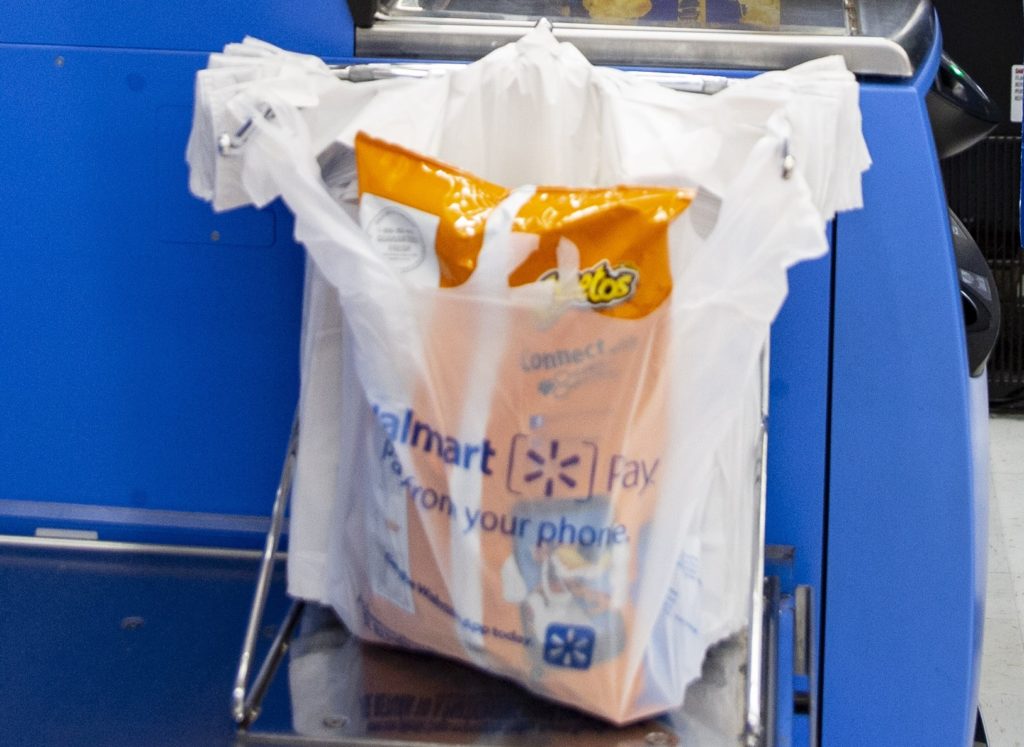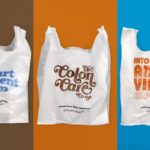
The push to reduce or eliminate plastic grocery bags hit a bump in the road this year, when local governments temporarily stopped enforcing bag bans and stores began discouraging the use of reusable bags during the coronavirus pandemic. But just going back to using plastic bags indiscriminately isn’t much of a long-term solution to pollution and waste. So some of the country’s largest retailers are joining forces to officially retire their plastic bags – just as soon as they figure out what to replace them with.
Closed Loop Partners, a socially-conscious investment firm that aims to reduce consumer and retail waste, has announced a new initiative called the Consortium to Reinvent the Retail Bag. Founding members Walmart, Target and CVS Health, along with retail partners Kroger and Walgreens, have joined the initiative to help brainstorm a better alternative to the single-use plastic grocery bag.
So if reusable bags are out for now, and plastic bags are on the way out, what exactly are you going to put your groceries in? That’s the big question the group is hoping to answer.
“Current alternatives to the plastic retail bag have yet to garner industry-wide support or widespread use by the public and many still have significant environmental impacts,” Closed Loop Partners said in a statement. So its members have committed more than $15 million to solicit and develop “innovative design solutions” from anyone who has an idea.
“Do you have a game-changing sustainable bag solution?” the group’s website asks. From August 3 through September 10, “innovators, suppliers, designers and problem-solvers” are invited to submit their ideas, for a potential piece of $1 million in funding to develop the idea.
The winning concept must “delight the customer and enhance or maintain the customer experience compared to existing solutions.” It will also need to use sustainably and ethically sourced materials, minimize harmful impact in manufacturing, and be reusable, recyclable and/or compostable.
Got an idea? Then send it in, earn some cash and save the planet at the same time!
Now is the perfect time to launch the initiative, the group says, since the pandemic has “revealed the vulnerabilities of our current system” by shaking up what were once reliably routine retail habits. Our supply chain is more fragile than we thought, prices and promotions are more volatile than ever, and well-meaning plastic bag bans are easily cast aside when they clash with public health concerns.
“The status quo has been shaken, presenting a unique opportunity to build back better and reimagine a more resilient and sustainable way of doing business,” Closed Loop Partners’ Kate Daly said in a statement. “During challenging times, unexpected and unprecedented collaboration is required.”
Kroger had already announced two years ago that it planned to phase out single-use plastic bags by 2025. “Our customers have told us it makes no sense to have so much plastic only to be used once before being discarded. And they’re exactly right,” Kroger CEO Rodney McMullen said at the time. Kroger’s Seattle-based chain QFC was the first to make the transition, first switching to free paper bags, then offering reusable bags for sale.
But plastic, paper and reusable bags all have their problems. Paper bags are compostable, but they require more resources to manufacture. Reusable bags also require more resources, and they can carry germs if they’re reused without being washed. And plastic bags, once hailed as “the sack of the future,” may present the biggest environmental challenges. Closed Loop Partners cites research saying more than 100 billion single-use plastic retail bags are used in the U.S. every year, and less than 10% are recycled. And the average “working life” of a plastic retail bag before it’s no longer needed? 12 minutes.
So there must be a better way. It’s just a matter of coming up with one.
The group is calling on other retailers to join its efforts, and is encouraging its customers to get engaged and involved. “We know how important it is to bring our customers along on our sustainability journey, keeping in mind that most are looking for convenience with minimal environmental impact,” CVS Chief Sustainability Officer Eileen Howard Boone said in a statement. “We’ll be looking for solutions that still deliver the convenience consumers love, but with much less impact on the environment,” Target added.
So start dreaming up some ideas – you have less than two months to submit them. “Who knows,” Target says, “maybe your design will be one of the solutions we’re looking for.” If so, you could claim a share of a million bucks – and line your pocket, while saving the planet.
Image source: Walmart
















i like both the above ideas..and I would make the paper bags out of recycled paper bags. I’ve seen them. Recycled paper bags for those who won’t bag their own in the bought bags even with monetary incentive.
Provide consumers (at a cost) a reusable bag that is sturdy and washable (and, a material that resists germs). THEN, give a reasonable refund for every bag they use bagging groceries. The motivation is in the consumer saving money. I do wish everyone would be more conscience of helping the planet, but that’s not reality. Consumers will do what is most convenient and a money saver.
Paper bags are a wood product that would naturally break down in the soil, plastic will not. Paper may need to be shredded to speed up the break down the composting and be used in the soil composition.